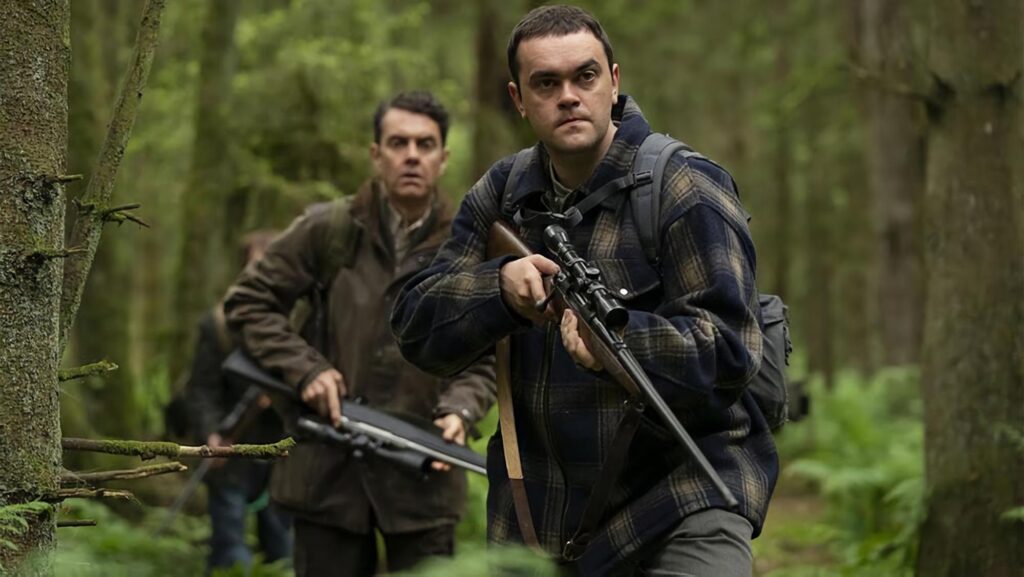“Betrayal” is a Harrowing Test of Brotherly Love

Every family has their secrets. Some are more trivial like private jokes or quirky traditions. Other secrets are darker: a hoard of cash in a hidden safe or brutal methods of corporal punishment. But few clans have secrets so dark as those at the heart of Betrayal. Rodger Griffiths’ gut-wrenching film follows a family torn apart by generational trauma and the thin line between love and hate. Three brothers attempt to protect each other from their abusive father but find that the truth behind a tragic fall may be more horrific than they could have imagined.
The film begins with an ill-fated hunting trip. John (Brian Vernel), Henry (Daniel Portman), and Vince (Calum Ross) have colluded to lead their father Don (Paul Higgins) out into the woods with plans to avenge their mother’s death. Henry shoots the violent man before he can bash John’s head in with his rifle, then the three shocked sons hastily bury him in the shallow earth. But a valuable key dropped into his makeshift shroud forces them back out to the unmarked grave. Returning to the scene of this justifiable crime, they’re dismayed to find nothing but dirt where their father once lay. Who among them has betrayed the group or has their nightmarish father somehow returned from the dead?
In a stunning feature film debut, Griffiths explores the heartbreaking reality of domestic violence. This despicable family patriarch rules his home with an iron fist, threatening to kill his wife and children should they try to escape. Wearing a golden key around his neck, Don taunts them with the promise of great riches, but will not give details about this mysterious fortune. A series of flashbacks give us a window into this harrowing home as the brothers and their skittish mother try to avoid sparking Don’s anger. Survivors of systemic abuse will likely feel seen by this disturbing portrait of a violent household and the cruel monster at its center. Adding nuance to the story, Griffiths’ richly woven characters show just how hard it can be to walk out the door.
Though possibly triggering, Griffiths does not lean into exploitation. We hear about disturbing incidents from the brothers’ childhood and watch them tiptoe around the tyrant, but we’re not made to endure scenes of horrific assault. Strong performances are enough to convey the enormous threat Don poses while leaving us to fill in the upsetting details for ourselves. It’s a harrowing portrait of toxic power, made all the more disturbing because of its quiet authenticity.
Griffiths elicits top notch performances from his cast, making the heartbreaking message feel all the more poignant. The film rests on the shoulders of these world-weary brothers and their believable chemistry pulls us into the family’s dark heart. Each young man’s familial role feels achingly real and there’s no guarantee that they will survive their father’s wrath. Portman wins our sympathy as Henry, tasked with completing impossible tasks when his brothers cannot. Vernel brings out quiet strength in John, the more sensitive brother determined to avenge his mother’s memory. But it’s Ross who truly breaks our hearts as the naive and idealistic youngest child. The apple of his father’s eye, Vince longs to believe Don’s blatant lies and clings to the illusion that this broken family can find a way back.
Don is a despicable villain who seems to delight in causing pain. No infraction is too small and this hateful father will stop at nothing to maintain his dominance. Griffiths nods to the reality of domestic abuse by informing us that Don’s father was even worse, while refusing to excuse him for his own egregious actions. An antique chair symbolizes generations of abhorrent behavior and the brothers’ attempts to break the cycle. Higgins attacks the role with a disturbing tenacity, knowing when to turn on the charm. He’s able to maintain complete control with a practiced blend of violence and manipulation, knowing he can compel his sons to hurt each other without getting his own hands dirty.
In the midst of all this heartbreaking pain lies a gorgeous film set in the Scottish woods. Betrayal has a distinct lived-in feel and even interior shots at the family’s ancestral home carry a rustic authenticity. Griffiths breaks away from unimaginable heartache with breathtaking shots of the immersive woods and moonlit landscapes mirroring the story’s dark themes. As the brothers fall deeper into paranoia, guilt, and shame, Griffiths creates a harrowing study of generational trauma and reminds us that sometimes the human monsters are scariest of all.
Jenn Adams is a writer, podcaster, and film critic from Nashville, TN. Find her social media nonsense @jennferatu.